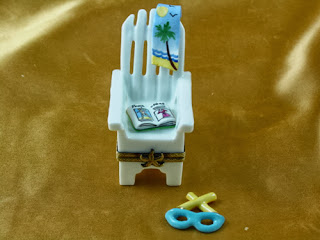For many decades now, Rochard Limoges boxes been used synonymously for French porcelain boxes. Exquisite, classy and elegant in nature, these premium Limoges porcelain boxes are appropriate for your collection or to be gifted to someone special. A careful research of e-catalogs can help you get your hands on well designed, hand-painted boxes-- that speak volumes about your taste for something different.
So, whether you are looking for the perfect gift for your Mom on Valentine's Day, Easter, Halloween, Thanksgiving or Christmas or desirous of arranging your precious assets into stylish boxes –think Rochard Limoges boxes. You will be pleased with your selection.
Authenticity of Rochard Porcelain
Look for the ‘Limoges, France' stamp. It is usually placed at the base of boxes and figurines. This mark guarantees authenticity and ensures that you are investing in the right place. You should also look for the lot number printed alongside --which verifies that your chosen
piece is an integral part of an exclusive/ limited edition collection crafted by a master artist.
Original use of Limoges porcelain boxes
Get ready to be surprised. The contemporary uses of these porcelain boxes are much different from their original use. Today, they are used as collector’s items or as storage space for your valuable knick-knacks. In the years gone by, these very boxes were used to keep snuff or tobacco leaves!
Given their elegant look and appeal, they were later used to ferry love epistles to one’s beloved as well. Over time, they started playing the role of engagement ring boxes and were used to keep delicate pieces of bracelets, rings and trinkets. Also used by noble ladies to carry their makeup items and other precious belongings, these boxes are rare and exquisite and bear the mark of Rochard.
About the Company
Known for manufacturing both porcelain figurines and boxes, the manufacturers have made their mark through superior craftsmanship and the best designs. The hand-painted pieces of porcelain pieces from Rochard find a pride of place amongst the most coveted collector's items of our modern-day world.
The products from this company are packaged in smart designer boxes and boast of a certificate of authenticity. Granting the utmost value for your money, the designer figurines and trinket boxes from Rochard rank amongst the top of the line products and are exclusive, authentic and priceless—in every manner possible.
With a Rochard box or figurine in your hand, you can be assured of taking home the best gift for your mom. So stop looking elsewhere and get your hands on the finest piece of porcelain in your favourite gift store. With the “Rochard’s” Mark in place, you will be investing in high quality, value and timeless worth alike. Just go for it!
So, whether you are looking for the perfect gift for your Mom on Valentine's Day, Easter, Halloween, Thanksgiving or Christmas or desirous of arranging your precious assets into stylish boxes –think Rochard Limoges boxes. You will be pleased with your selection.
Authenticity of Rochard Porcelain
Look for the ‘Limoges, France' stamp. It is usually placed at the base of boxes and figurines. This mark guarantees authenticity and ensures that you are investing in the right place. You should also look for the lot number printed alongside --which verifies that your chosen
piece is an integral part of an exclusive/ limited edition collection crafted by a master artist.
Original use of Limoges porcelain boxes
Get ready to be surprised. The contemporary uses of these porcelain boxes are much different from their original use. Today, they are used as collector’s items or as storage space for your valuable knick-knacks. In the years gone by, these very boxes were used to keep snuff or tobacco leaves!
Given their elegant look and appeal, they were later used to ferry love epistles to one’s beloved as well. Over time, they started playing the role of engagement ring boxes and were used to keep delicate pieces of bracelets, rings and trinkets. Also used by noble ladies to carry their makeup items and other precious belongings, these boxes are rare and exquisite and bear the mark of Rochard.
About the Company
Known for manufacturing both porcelain figurines and boxes, the manufacturers have made their mark through superior craftsmanship and the best designs. The hand-painted pieces of porcelain pieces from Rochard find a pride of place amongst the most coveted collector's items of our modern-day world.
The products from this company are packaged in smart designer boxes and boast of a certificate of authenticity. Granting the utmost value for your money, the designer figurines and trinket boxes from Rochard rank amongst the top of the line products and are exclusive, authentic and priceless—in every manner possible.
With a Rochard box or figurine in your hand, you can be assured of taking home the best gift for your mom. So stop looking elsewhere and get your hands on the finest piece of porcelain in your favourite gift store. With the “Rochard’s” Mark in place, you will be investing in high quality, value and timeless worth alike. Just go for it!











